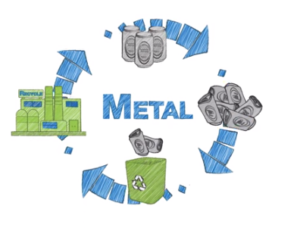The sustainable role of metals
Recycling materials has been an important part of sustainable living to reduce waste and the use of energy for some time. Aluminium specifically has long been a leader in recycling because it is a permanently available material that can be easily recycled again and again, without losing any quality of its structural integrity. It can be reformed and transformed infinitely. What may start out as a drinks can, can then be reused and recycled; melted down and then turned into another can for example, or an iron, a car or perhaps even an aeroplane wing.
Towards the end of 2017, aluminium beverage cans were officially certified as the world’s most recycled drinks container by Resource Recycling Systems (RRS). Add that to the fact seven out of 10 drinks cans sold in the UK are already being recycled and up to 80% of all aluminium ever produced is still in use today, the can has the best track record as a sustainable packaging form. Metal Packaging Europe (MPE) also recently revealed that the global weighted average recycling rate for aluminium is 69%, compared to PET at 43% and glass at 46%.
The success of recycling aluminium is not just down to conscientious industries or consumers, it is also down to the fact that aluminium cans are much more valuable than other packaging materials, making the recycling of drinks cans easily financially viable and self-sustaining. The value of recycled materials can vary. For glass, for example, New Scientist recently stated that “waste managers often have to pay recyclers to take glass off their hands” (19.7.17).
But it’s not just aluminium that’s proven to be a ‘green’ hit – steel for packaging recorded an average European recycling rate of 78% in 2015, a record performance, which included five countries exceeding 85%. With greater focus being placed on packaging in the media and the UK Government announcing environmental plans for the next 20 years, consumers are now more concerned than ever about the waste being produced and are keen to know that their choice of purchase meets their environmental expectations.
So what makes a drinks can sustainable?
- It’s infinitely recyclable – otherwise known as a permanently available material that can be reused again and again for multiple purposes
- It doesn’t lose its structural integrity in the recycling process
- Aluminium cans are 100 per cent recyclable
- Cans are cube efficient, requiring less space for transportation
- It is widely collected via existing kerbside and ‘on the go’ schemes and is also collected for re-use whilst other waste is incinerated
- Making one aluminium beverage can from raw materials uses the same amount of energy that it takes to recycle 20 (Novelis)
- Recycled aluminium has exactly the same properties as new – but takes just five per cent of the energy to produce (Alupro)

Use, recover, regenerate: the circular economy
Beverage cans fit into the circular economy – where resources are used, recovered and regenerated. Permanent materials like drinks cans are the building blocks for the circular economy. If you heat aluminium or steel scrap in a recycling facility to the point where it melts, what comes out is completely the same as what went in because metal is unalterable structurally. It’s then kept in use at its highest utility and value for as long as possible, ensuring that the maximum usage out of metal through recycling is achieved.
There is a need for the right legislative framework to be in place to achieve a functioning circular economy. It must start and end with a new product that can be recycled again and again. This means the focus should be on multiple-life-cycles, ideally without loss of quality or need for new source material. These multiple lifecycles are where cans stand out over other packaging forms as all of the drinks cans produced can be re-used for a multitude of purposes.
The aluminium can’s green credentials can be a win for a drinks brand in terms of achieving sustainability goals and delivering on consumer promises. Meeting and exceeding consumer expectations is the basic principle of business and consumers today are increasingly demanding that the products they choose to buy are as easily recyclable and as sustainable as possible.